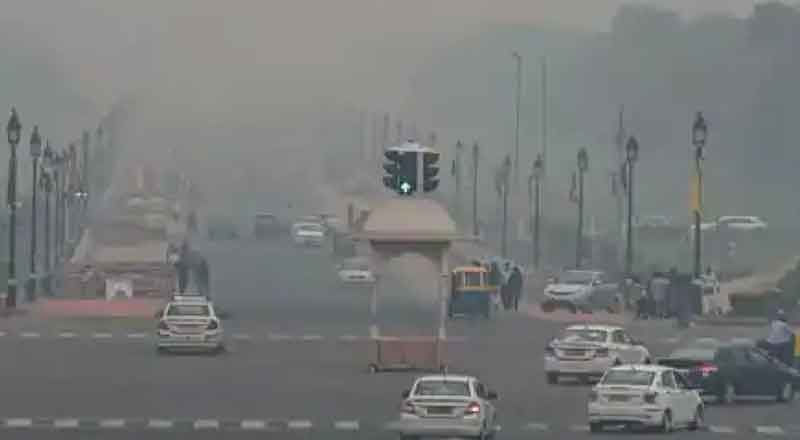- Delhi’s air quality continues to deteriorate with AQI levels above the 400 mark for the fourth consecutive day on Monday.
- Delhi CM has called for a high-level meeting with the environment minister and other officials.
- As per the Graded Response Action Plan (GRAP), if the AQI of the city crosses 450-mark, authorities will invoke GRAP- stage 4 category measures.
- The rampant stubble burning in northern India continues to impact Delhi’s air quality.
- The Commission for Air Quality Management (CAQM) has recommended that 50% of government and private office employees be allowed to work remotely.
- Due to the elevated levels of pollution, Delhi’s Education Minister announced the closure of primary schools in the capital city until November 10.
Delhi’s air quality continues to engulf the capital and its nearby region with a deteriorating Air Quality Index (AQI). On Monday, the AQI of the national capital stood above the 400 mark in the ‘critical’ category, according to the System of Air Quality and Weather Forecasting and Research (SAFAR).
Monday (Nov 6) is the fourth consecutive day when pollution levels in the capital city remained at an all-time high. The AQI in Delhi’s Anand Vihar touched a massive 999 on Nov 2, with a toxic and poisonous haze engulfing the entire area throughout the day.
In the wake of skyrocketing levels of air pollution in the capital, Delhi’s Chief Minister Arvind Kejriwal has called for a high-level meeting in Delhi on Monday (Nov 6) to assess the situation. The meeting is scheduled to take place at 12:00 noon IST. The meeting will be attended by Delhi’s Environment Minister Gopal Rai and all officials of concerned departments.
As per the Graded Response Action Plan (GRAP), if the AQI of the city crosses 450-mark, authorities will invoke GRAP- stage 4 category measures.
The measures under Stage 4 include a complete ban on entry of trucks into Delhi, and stopping construction activities in Delhi, including linear projects like highways and roads. A ban will also be imposed on the plying of Delhi-registered diesel medium good vehicles and heavy goods vehicles and a ban on light commercial vehicles outside Delhi (unless essential).
It also gives states and the center discretion on whether they need to allow employees to work from home, ban physical classes for higher grades, and even if they wish to implement the odd-even scheme.
The rampant stubble burning in northern India continues to impact Delhi’s air quality. Punjab alone recorded over 1000 fires for a fourth consecutive day. Though showing a declining trend, Indian Agricultural Research Institute (IARI) data showed Punjab recorded 1,360 farm fires on Saturday.
To make the situation worse, Delhi’s win direction is also playing a role. As per IMD, Delhi’s air is north-westerly, which is likely to help stubble intrusion into the capital.
The Commission for Air Quality Management (CAQM) has urged Delhi and NCR states to impose a ban on construction activities related to linear public projects. They have also recommended that 50% of government and private office employees be allowed to work remotely.
The Stage IV of the Graded Response Action Plan (GRAP) has been implemented in Delhi, during which only CNG, electric, and BS VI-compliant vehicles from other states are permitted to enter Delhi. Exemptions are granted only to those involved in essential services.
• The Transport Department of the Delhi government has issued an order prohibiting the entry of trucks, except those transporting essential goods, into the national capital in line with Stage IV of the revised GRAP and is in accordance with Section 115 of the Motor Vehicles Act, 1988.
• The same order also restricts the entry of light commercial vehicles registered outside Delhi, except for electric vehicles, CNG, and BS VI-compliant vehicles, unless they are transporting essential commodities.
• Due to the elevated levels of pollution, Delhi’s Minister Atishi on Sunday, announced the closure of primary schools in the capital city until November 10.
(With inputs from agencies)





